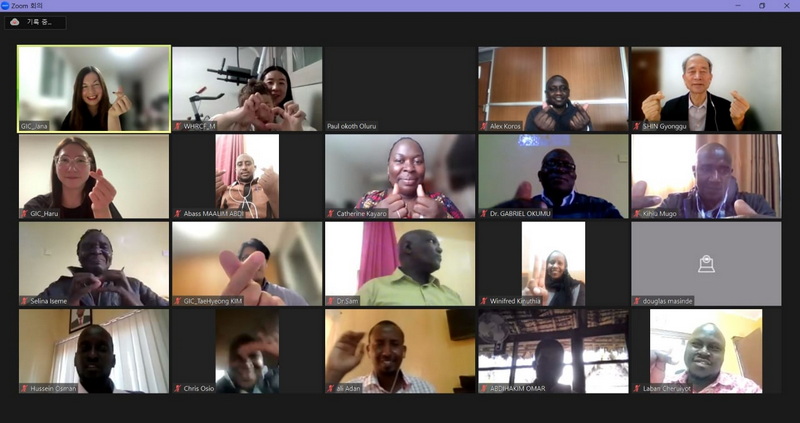The 2022 Human Rights Education Training Program for Sustainable and Inclusive Communities
By Jana Milosavljevic
Following the successful completion of the 2021 Online Human Rights Education Training Program for Sustainable and Inclusive Communities in November last year, this year Gwangju Metropolitan City, represented through the Gwangju International Center (GIC), conducted another KOICA Fellowship Program: the CIAT (Capacity Improvement and Advancement for Tomorrow). The 2022 training program was also held fully online, conducted under the same name and targeting the same country: Kenya. Nevertheless, even though there were some familiar faces among the lecturers and facilitators, this year’s program welcomed a whole new group of trainees and underwent a couple of changes to the curriculum.
For Gwangju News readers who would like to learn more about the background of the GIC’s cooperation with KOICA in conducting the human resources development training program, “Human Rights Education Training Program for Sustainable and Inclusive Communities,” as well as to find out more about last year’s program, we recommend going back to issue #238 of the Gwangju News, published in December 2021.
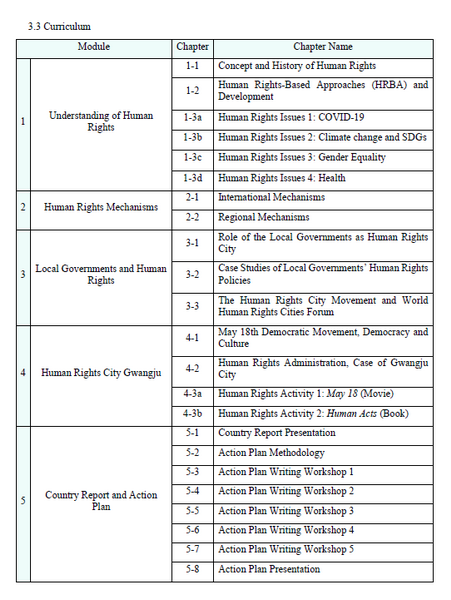
The 2022 Human Rights Education Training Program for Sustainable and Inclusive Communities gathered high- and mid-level government officials from Kenya and was held over a period of 10 days, from October 24 to November 2. Speakers from the Raoul Wallenberg Institute of Human Rights and Humanitarian Law (RWI), the United Cities and Local Governments (UCLG), the City of Utrecht, the Kenya National Commission on Human Rights (KNCHR), Mayors for Peace, and Chosun University, as well as a representative of Gwangju City Hall and the GIC were invited this year to conduct online lectures, seminars, and human rights activities. The focal points of the training program were regional human rights mechanisms, local governments’ roles in and examples of promoting human rights, human rights-based approaches, and sustainable development goals.

This year as well, the trainees worked in teams, analyzing the human rights sensitivity within their respective organizations and presenting the results in the form of a “country report” at the beginning of the program. As the main goal of the program is elevating human rights administration in Kenya through the process of creating and later implementing a specific “action plan” based on the country report’s findings, each team worked on creating a human rights education program to establish a culture of human rights within their organizations and promote human rights on a national level. Through specific “action-plan writing workshops,” the trainees were able to discuss the process and receive feedback on their action plans with guidance from the facilitators, who were none other than the program’s alumni from last year.
We asked the trainees to share their impressions about the training program. What follows are the impressions of four of the trainees in the program.

Dr. Gabriel Juma Okumu, deputy director of Compliance and Quality Assurance of the Public Service Commission, had the following to offer:
“I count myself lucky to have been given an opportunity to attend the 10-day intensive online Human Rights Education Course organized by KOICA. The training came with the backdrop of another assignment that was very involving. I consoled myself and hoped that because the training was virtual it would only take three hours daily. Then I would use the rest of the time to work on the related assignments. The first activity was to prepare a country report, which was to be submitted the Sunday before the start of the program. As one of the four officers from the Public Service Commission, we prepared and submitted the report as expected.
“Come Monday, October 24, the lectures began, and that is when it dawned on us that they would run the whole day with only a one-hour lunch break. Besides the lectures, we also had group assignments on a daily basis because each group was expected to submit an action plan based on the country report submitted earlier. As team one, we purposed from the outset to work hard and prepare the best action plan. We burned the midnight oil to ensure that we prepared a good action plan that was based on improving representation of PWDs [persons with disabilities] in public service institutions to the constitutional threshold of 5 percent. We look forward to implementing the action plan, which has been shared with the CEO for purposes of implementation.
“For me, the greatest lesson is that with determination, good leadership, and meaningful participation of the people, it is possible to transform a country within a short time. The knowledge I got from the program will enable me to be a human rights champion. Thank you, KOICA, for the training, and a special thanks to Ms. Jana for being a great coordinator.”
Ms. Maina Nelly Awuor is senior gender officer in the State Department for Gender, part of the Ministry of Public Service and Gender. She also had a very positive opinion of the training program:
“The training program was a big hit for me, as it presented a complete overview of human rights education. The well-structured outline of the topics allowed me to have a clear understanding of our action plan, particularly during discussions that proved to be vital. The training experience also gave me some useful and relevant insights that opened new horizons for me as gender equality champion. The training program will definitely shape my future as a practitioner in a profound manner.
“Regarding specifics such as the writing workshops and presentations, I got an opportunity to scale up my research skills. Furthermore, due to the damaging effects of climate change ravaging my country, Kenya, I got to learn more about adaptation mechanisms that intrigued me to play my part in the response for a prosperous future. I enormously enjoyed the many lessons I had with the facilitators who were timely, efficient, and consistent.”
Mr. Mohammed Angunza Rashid, is assistant director of the Directorate of Quality Assurance in the Ministry of Education. He expresses how happy he was with the program:
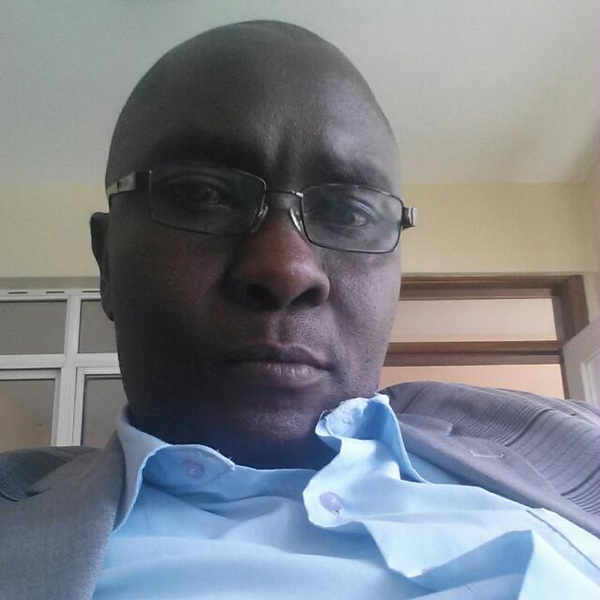
“I was delighted to be part of the team that participated in the Human Rights Education Training Program for Sustainable and Inclusive Communities. After the training, may understanding of human rights was broadened. Issues and circumstances that would otherwise pass unnoticed as human rights violations were brought to the fore.
“Development of the action plan enabled me to think through and visualize how human rights can be mainstreamed in the Ministry of Education programs. Working as a team drawn from the same state department afforded an unprecedented opportunity to think through issues at hand and agree on a common position. Thank you for the opportunity. I am looking forward to further interactions.”
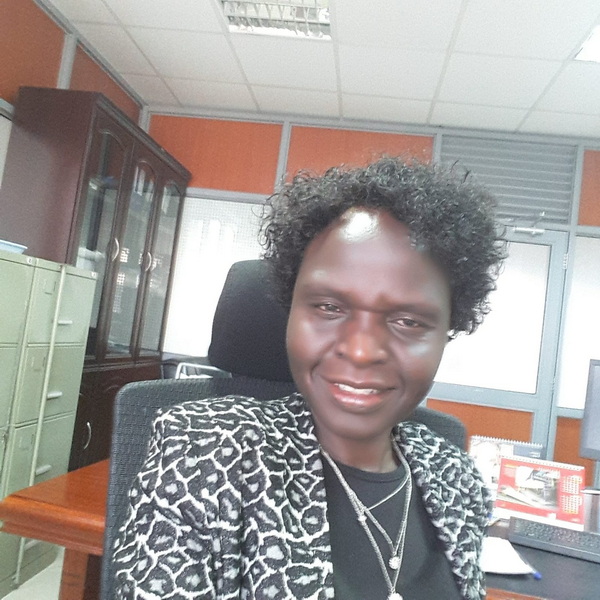
Lastly, Selina Amsugut Iseme, deputy director of Legal Services in the Public Service Commission, tells us what her key take-away from the program was:
“It was an honor for me to attend the human rights education training program. As intense as the program was, I enjoyed every bit of it. The knowledge gained was worthwhile. I appreciate the preparation that went into organizing the training event, as everything went as per the program outline. A key takeaway for me was that it is possible to reduce the inequalities vulnerable groups face in accessing services and achieve an inclusive and sustainable community. It requires deliberate effort through leadership and participation by the citizens to make it happen. The citizens must have both the knowledge and the space to implement said knowledge. For the citizens to participate meaningfully, education is paramount. Thank you, GIC and KOICA.”
The Author
Jana Milosavljevic was born and raised in Serbia. She currently lives and works in Gwangju as one of the GIC’s coordinators. She loves exploring new places, learning about new cultures, and meeting new people. If you are up for a chat, she can talk to you in Serbian, English, Korean, Japanese, or German.
Useful Websites
- http://www.koica.go.kr/koica_en/3441/subview.do (KOICA CIAT)
- http://www.inhec.org/index_e.php (Human Rights Education Center)
- https://rwi.lu.se/ (RWI)
- https://www.uclg.org/ (UCLG)
- https://www.knchr.org/ (Kenya National Commission on Human Rights – KNCHR)







